QuestionPicking up my new golden retriever, what is the best way to adjust the puppy with the one year old border collie, and do you have suggestions on how to keep them from chewing everything in the house?
Thanks!!
AnswerHaving a good pack structure reduces such problems. The dogs see all the
people and dogs in the household as a pack with each having their own rank in
the pack and a top dog. Life is much easier if the 2 legged pack members
outrank the 4 legged ones. You can learn to play the role of top dog by
reading some books or going to a good obedience class. A good obedience class
or book is about you being top dog, not about rewarding standard commands with
a treat. Start at http://www.dogsbestfriend.com/ Top dogs can do as they feel like, including adding new pack members. It is the duty of the rest of the pack to welcome the new comer and help care for it.
Let the puppy relieve itself before going in. Then have the Collie restrained, on leash or a tie down. Bring the puppy in, and turn it loose. Let it and the Collie greet each other. Show your excitement and delight with the new puppy. Use it name a lot. Do not tolerate negative behavior from the Collie. A wrinkled nose or raising the hair on the back calls for a correction. The first thing the puppy will want to chew is the Collie. With a one year old, this may go fairly well. The Collie should be allowed a few quick nips to say enough is enough. In general I am amazed at how well younger dogs tolerate the sharp little puppy teeth.
Give the Collie plenty of one on one attention. If you haven't done obedience training, now would be a good time. The extra attention from drilling commands would go along way to assure the Collie it is still an important member of the pack.
A mousetrap is very effective in making a dog leave something alone. Most
dogs will stay away from anywhere they were surprised by a snap. The best
part is that it is not you that is correcting the dog. It works whether you
are around or not. The mousetrap is very patient and is always on task as
long as you reset it.
Better than mousetraps when you aren't around is the crate. Other dogs may
not be as bad as the young Labs I am plagued with. Still your house and dog
will be much safer with the dog in a crate when you are away. The dog may be
happier in its den than loose in the house. It relaxes, it feels safe in its
den. It rests, the body slows down reducing the need for water and relieving
its self. Dogs that have been crated all along do very well. Many of them
will rest in their crates even when the door is open. I think the plastic
ones give the dog more of a safe, enclosed den feeling. They are harder for
dogs to open too. Metal ones can be put in a corner or covered with
something the dog can't pull in and chew. Select
a crate just big enough for the full grown dog to stretch out in.
Leave it some toys. Perhaps a Kong filled with peanut butter. Don't leave
anything in the crate the dog might chew up. It will do fine without even any
bedding. You will come home to a safe dog and a house you can enjoy.
Accidents and damaged possessions are the fault of whoever was watching the puppy. When you are watching it, immediately correct it as soon as it goes for anything except its own toys. In a quiet, but firm voice ''Bad dog, its name drop!''. Gently remove what ever and replace it with one of her toys. Later hold eye contact until the puppy drops it.
You didn't ask, but this is just what I am going to be doing. I pick up a 7 week old Lab/Golden cross Saturday. My 13th young puppy since 1991. It is a black Female we will call Sheba. I have been telling 11 year old Aster all about Sheba, explaining how she will bite her ears.
Much of housebreaking is not training the puppy, but making it easier for your
puppy, you, and your carpet while its body to catches up to its instincts. At
around 8 weeks when the puppy goes to its new home, the time from when it
realizes it has to go, and when it can't wait any longer is a matter of
seconds. Only time will fix that. You can hardly be expected to be attentive
enough to avoid all accidents There is no sense punishing the puppy for your
inattention. It is not fair to punish you either, but you still have to clean
it up if you didn't have the puppy outside in time.
Housebreaking starts before you get home with the new puppy. If you don't have
a crate, buy one. I prefer the more enclosed, den like plastic ones. Skip the
bedding. At first it gets wet, and later it can be chewed into choking
hazards. A wire rack in the bottom will help keep the puppy up out of
accidents at first. They are available with the crates, but a piece of closely
spaced wire closet shelving from a home supply place is cheaper. If you
already have a metal crate, covering it may help. Just make sure you use
something the puppy can't pull in and chew. Dogs that start out in crates as
little puppies, accept them very well. Never leave an unattended puppy loose
in the house. If nobody can watch it, put it in the crate. I suggest letting
the dog have its crate all its life.
Choose a command and spot you want it to use. The less accessible to strays,
the less chance of serious disease. If it is a female, choosing a
non grassy spot will avoid brown spots later. When you bring it home, take it
to the spot and give it the command in a firm, but friendly voice. Keep
repeating the command and let the puppy sniff around. If it does anything,
praise it. Really let it know what a good dog it is and how much you love it,
and maybe a treat. Note, being out there not only means you can praise it,
but it also keeps it from being snatched by a hawk. If it doesn't go, take it
inside and give it a drink and any meals scheduled. A young puppy will need to
go out immediately afterward. Go to the spot and follow the above routine.
Praising it if it goes is extremely important. If it doesn't go, take it back
inside and put it in its crate and try again soon. Do not let it loose in the
house until it does go.
At first it is your responsibility to know and take the puppy out when it
needs to go. It needs to go out the first thing in the morning, after eating,
drinking, and sleeping. If it quits playing, and starts running around
sniffing, it is looking for a place to go. Take it out quickly. You will just
have to be what I call puppy broke until it is a little older.
By the time most dogs are about 3 months old, they have figured out that if
they go to the door and stand, you will let them out. The praise slowly shifts
to going to the door. Some people hang a bell there for the dog to paw. If
your dog doesn't figure this out, try praising it and putting it out if it
even gets near the door. A stern "Bad dog!" is all the punishment that is
effective, and only when you catch it in the act and are sure you didn't miss
it going to the door. Clean up accidents promptly. I mostly keep the little
puppies out of the carpeted rooms. Still I need the can of carpet foam
sometimes. First blot up all the urine you can with a dry towel. Keep moving
it and stepping on it until a fresh area stays dry. A couple big putty knives
work well on bowel movements. Just slide one under it while holding it with
the other. This gets it up with a minimum of pushing it down into the carpet.
This works with even relatively soft ones, vomit, dirt from over turned house
plants, or anything else from solids to thick liquids. Finish up with a good
shot of carpet foam. Note, do not let the puppy lick up the carpet foam.
Once the dog is reliably housebroken, your carpet may need a good steam cleaning.
I just answered another question from somebody that is getting a Jack Russell. We can all share our puppies I guess.

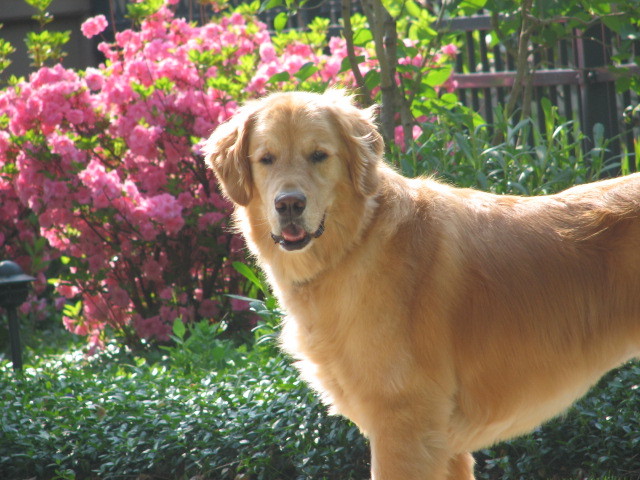 Goldens and cancer
Question
Duke
I just read your response to a women who
Goldens and cancer
Question
Duke
I just read your response to a women who
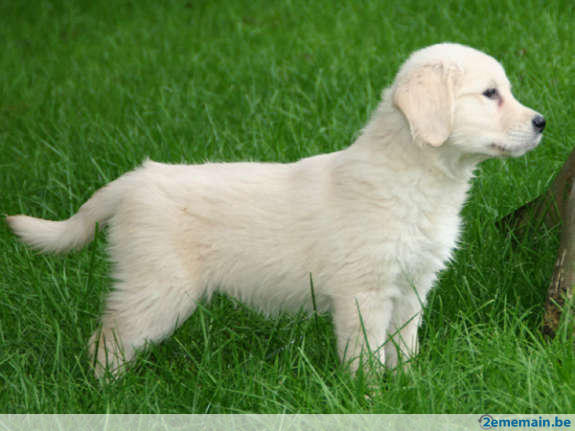 Golden retriever
QuestionGolden retriever puppy
QUESTION: Hello,
Golden retriever
QuestionGolden retriever puppy
QUESTION: Hello,
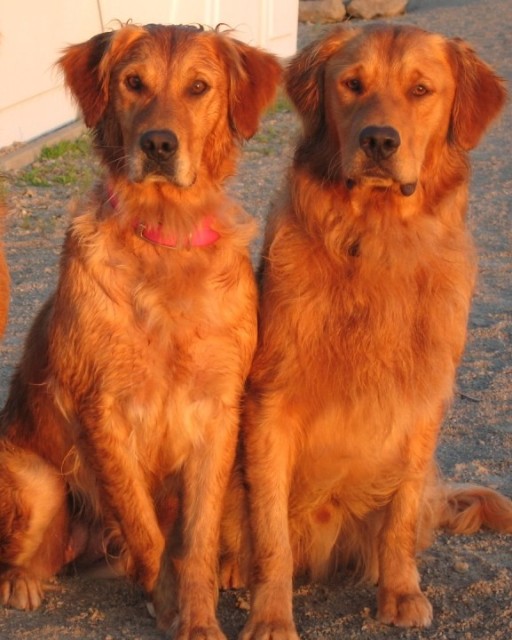 my golden puppy has bad skin problems
Questionso i have had this skin problem with my golden
my golden puppy has bad skin problems
Questionso i have had this skin problem with my golden
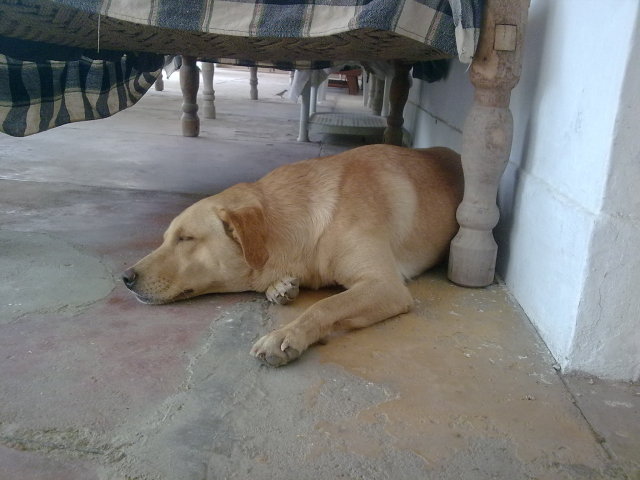 confrmation of lab retriever breed
Questionmy lab
QUESTION: sir can u possibly asur
confrmation of lab retriever breed
Questionmy lab
QUESTION: sir can u possibly asur
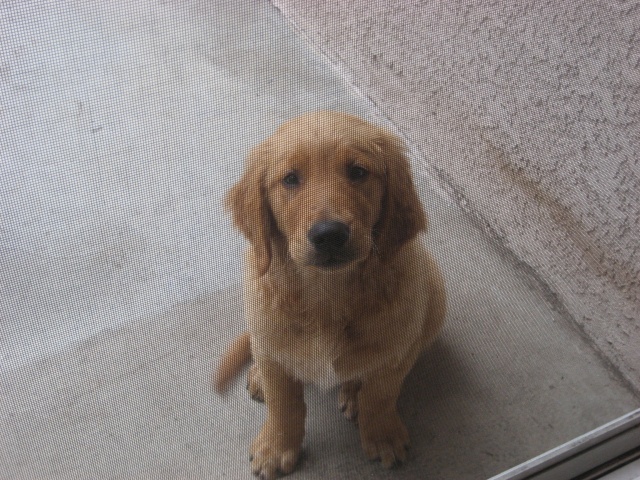 Walking
Question
My 1 year old golden retriever is very hyper-
Walking
Question
My 1 year old golden retriever is very hyper-